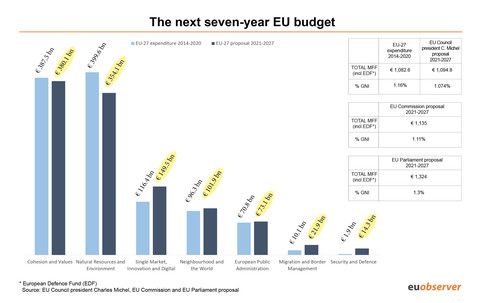EU leaders on Thursday evening (20 February) attempted to overcome major differences in the way they see the bloc's next seven-year budget, at their summit in Brussels.
The departure of the UK leaves a €60-75bn gap in the over one trillion euro spending plan over 2021-2027, and wealthier countries that pay more into the EU budget are being asked to pay the bulk of it.
While all member states will have to pay more, a group of rich countries, the Netherlands, Sweden, Austrian and Denmark and also Germany are arguing to limit spending at 1.0 percent of EU gross national income (GNI) and want to retain the rebate, a form of backdated compensation.
Poorer member states want to reverse cuts to EU subsidies. Meanwhile all member states are also feeling the pressure to do more on climate, migration, digitalisation and foreign affairs.
National leaders have all criticised the EU Council president Charles Michel's attempt at a compromise, of 1.074 percent of GNI plus deep cuts in traditional policies.
"The proposal on the table is that we are going to do more with less: less persons, less money. And I don' know if Michel is now the twin brother of David Copperfield, but I don't know how this should work," Luxembourgish prime minister Xavier Bettel quipped on arrival at the summit, referring to the magician.
"This MFF negotiation will be very hard and difficult," Estonia's prime minister Juri Ratas warned as he made his arrival.
Poland's premier Mateusz Morawiecki went furthery, saying the discussions will be the "hardest-ever negotiations in history" for the EU.
"We cannot accept a dramatic increase of our piece [contribution]," Swedish PM Stefan Lofven said as he entered talks, adding: "Countries with stronger economies need to pay more, but we cannot accept such a dramatic increase."
"[After Brexit] it is a clear signal for our citizens to say Europe is alive and we can still function really well." Latvian prime minister Arturs Karins argued before the meeting, urging an agreement.
"It's a complicated task and we will have to overcome big differences," Germany's chancellor Angela Merkel conceded.
"Germany is not satisfied with the current status of negotiations," she added
EU leaders will first discuss among themselves, then will break into smaller groups, or hold bilateral meetings. Talks could go into Friday, or even perhaps Saturday morning.
One of the key issues is whether member states can agree to retain the rebate to Germany, Denmark, Sweden, Austria and the Netherlands, while other countries argue the concept should disappear because the original UK rebate is gone.
"I have infinite patience," Portugal's Antonio Costa said on arriving.
Read more: Unhappy EU leaders begin budget haggle
The departure of the UK leaves a €60-75bn gap in the over one trillion euro spending plan over 2021-2027, and wealthier countries that pay more into the EU budget are being asked to pay the bulk of it.
While all member states will have to pay more, a group of rich countries, the Netherlands, Sweden, Austrian and Denmark and also Germany are arguing to limit spending at 1.0 percent of EU gross national income (GNI) and want to retain the rebate, a form of backdated compensation.
Poorer member states want to reverse cuts to EU subsidies. Meanwhile all member states are also feeling the pressure to do more on climate, migration, digitalisation and foreign affairs.
National leaders have all criticised the EU Council president Charles Michel's attempt at a compromise, of 1.074 percent of GNI plus deep cuts in traditional policies.
"The proposal on the table is that we are going to do more with less: less persons, less money. And I don' know if Michel is now the twin brother of David Copperfield, but I don't know how this should work," Luxembourgish prime minister Xavier Bettel quipped on arrival at the summit, referring to the magician.
"This MFF negotiation will be very hard and difficult," Estonia's prime minister Juri Ratas warned as he made his arrival.
Poland's premier Mateusz Morawiecki went furthery, saying the discussions will be the "hardest-ever negotiations in history" for the EU.
"We cannot accept a dramatic increase of our piece [contribution]," Swedish PM Stefan Lofven said as he entered talks, adding: "Countries with stronger economies need to pay more, but we cannot accept such a dramatic increase."
"[After Brexit] it is a clear signal for our citizens to say Europe is alive and we can still function really well." Latvian prime minister Arturs Karins argued before the meeting, urging an agreement.
"It's a complicated task and we will have to overcome big differences," Germany's chancellor Angela Merkel conceded.
"Germany is not satisfied with the current status of negotiations," she added
EU leaders will first discuss among themselves, then will break into smaller groups, or hold bilateral meetings. Talks could go into Friday, or even perhaps Saturday morning.
One of the key issues is whether member states can agree to retain the rebate to Germany, Denmark, Sweden, Austria and the Netherlands, while other countries argue the concept should disappear because the original UK rebate is gone.
"I have infinite patience," Portugal's Antonio Costa said on arriving.
Read more: Unhappy EU leaders begin budget haggle

No comments:
Post a Comment